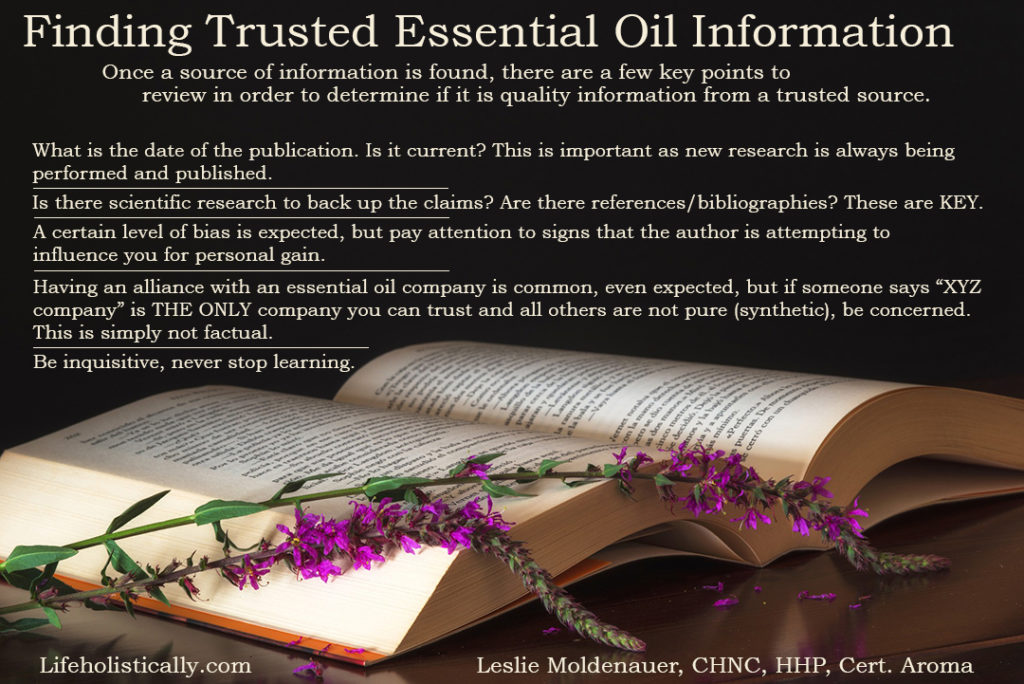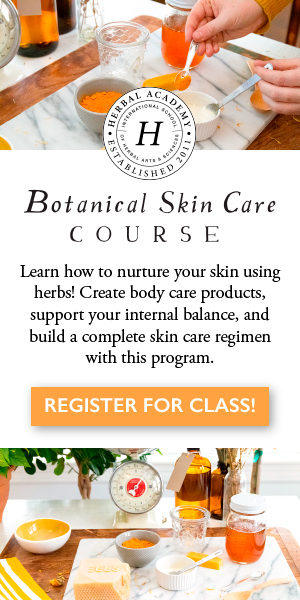Essential Oil and Confirmation Bias. Confirmation bias is a propensity to search for or interpret information that we find in a way that confirms one’s preconceptions. In other words, when performing research online or at the library or other learning institution, the individual doing the research has already made their decision about the topic before they have begun their search (1). Rather than looking to find “the truth” so to speak, they are looking for information that agrees with what they already think!
This is never a good approach. Why is this problematic? The list is long, and it applies to any industry or modality, but today my focus is on complementary medicine, specifically aromatherapy.
Performing research can be challenging, and I hope to give some examples and make some points in a little bit that will make it much easier for you. Before I do that, I want to talk about the challenges that we face. Aromatherapists know exactly how to research, (if they don’t, they need to!). Many others (essential oils enthusiasts) however, subscribe to the confirmation bias of some sort or even worse, “testimonials” to validate what they do for themselves or what they tell others to do.
“Confirmation bias is a direct influence of desire on beliefs”
What are the issues surrounding essential oils and confirmation bias?
1. We may pick out bits and pieces of data that make us feel good. Why do they make us feel good? Largely because they confirm our own prejudices (The preconceived opinion that is not based on reason or actual experience).
2. Seeking out information that we already perceive as correct and ignore or reject information that casts it out due to what someone else may have told them. This can cause much negativity and drama in FB groups. I shy away from participating in all of that. It does not serve a purpose.
These are very rudimentary examples, but the point is crystal clear. Here are two basic Google searches (you will see later why I do not subscribe to the Dr. Google phenomenon)
—“Research essential oils calming sedative effect”. (searches never need complete sentences) The first three returns on this search bring me to PubMed research papers.
—“Why lavender essential oil is so calming”. The first three returns on this search bring me to blogger sites A. BodyEcology.com B. Health.com C. MindBodyGreen.com
Can you begin to see the difference? When you put something in the search field that is more of a conviction that in inquiry….your results will differ.
3. Google has what is called an algorithm. Algorithms SUPPORT confirmation bias!
The definition of an algorithm is: “a process or set of rules to be followed in calculations or other problem-solving operations, especially by a computer” (2).
An algorithm is like a roadmap, and can even be compared to a recipe. (Do this, then this…or step 1…step 2…) When it comes to a basic Google search if you type anything close to what others have typed/searched many times over…you will likely get the same result they did…..and the results are not based on science…but popularity, or how many times it has been searched. Unfortunately, even erroneous information can be popular based on SEO (Search engine optimized) website plugin alone (3).
4. Confirmation bias can also be an issue where groups of people are seen as “not to be trusted”. Similar to “the world is a dangerous place”. In some instances this may be a “fear” of modern medicine, in others, it may be a case of “all complementary medicine is quackery”. Look at the website www.quackwatch.com for example.
5. Not only does confirmation bias impact how research is being done, but can also impact how people interpret and recall information.
—Interpretation. When you are reading a blog that is based solely on opinion, it leaves everything to interpretation. If an article has no references to back up their claims…move on.
—Recall/memory. This can go back to the testimonial issue. “My neighbor said this worked great for her child, so it will also work for mine”.
Neither is a good method of “research”.
6. Similar to the “Halo Effect” or “cognitive bias”, many people hold their “health guru” in high esteem. This can be health figures online, their chiropractor, or another type of complementary practitioner…..You have faith in their ability to “adjust your back and get you out of pain” or “they gave you advice before that really worked”…so everything they say much be gospel….right? Know the education of those whom you look to for health advice of any kind. You can read more about the halo effect here (4).
Essential Oil Skeptics-Confirmation Bias
What are the issues at hand for the ones that provide the information?
1. This one goes out to the online health gurus, mommy bloggers, and others out there who want a piece of the action in the essential oil world, (does not apply to all, but MANY). I kindly ask that you please take your responsibility seriously. Many people hang on your every word in what you are telling them. If you are not educated in this niche, please get educated. If you are not willing to do so, PLEASE consider going back to where your education lies…and MOST importantly, consider finding a qualified aromatherapist to work with.
All practitioners, eastern or western take an oath to “do no harm”. This needs to be #1 in all you share and teach. Some have said we need to “stay in our lane”, another way to put it is “stay within your scope of practice”.
2. The one performing the research has to do their due diligence as well. Yes, even the researcher dismisses information when it does not support their initial hypothesis. A good researcher will work to try to consistently challenge their hypothesis, not consistently work to prove it.
When I was in school, I did a project in which the research paper disproved their hypothesis. Many of the students were confused about why I chose to write my paper on it. It is important to understand that there is just as much importance in a paper that disproves the original hypothesis in those that prove it. This is quality research.
One last thought on Dr. Google. In utilizing aromatherapy, nutrition, or any other complementary therapy, Google can be utilized as a reference point, one that needs further research. If you find an article, please research other sources to see if the information is up to date and accurate. The goal for all of us is the same, to make the best choices for ourselves and our family using trusted information, as well as to know when and where to look for assistance when needed.
Learning How to Research-A Crash Course
This topic could be a series of blogs, but for now, I would like to just cover a few key points, and provide a few really good resources.
Superior to a blanket Google search would be to utilize research databases for evidence-based information. Find quality research that has been validated.
Here is a sampling of databases to help you perform your research:
PubMed
Google Scholar
MedScape
Tea Tree Oil Database
PubMed Central-Open Access research
The Best Method (the Gold Standard)
The best type of research paper is going to be a double-blind randomized controlled trial. According to Pubmed, “The double-blind randomized controlled trial (RCT) is accepted by medicine as an objective scientific methodology that, when ideally performed, produces knowledge untainted by bias” (5). This method removes the bias piece to research. The abstract of your paper will state what type of research was done. There are many other types such as but not limited to: cohort studies, case-controlled studies, and various surveys. Use the resources below to learn what those are as well as their advantages and disadvantages.
I can not tell you how many countless hours I combed through research papers hundreds of pages long with a highlighter and toothpicks to hold my eyes open (kidding on the latter), to write a quality literature review for grading. Double-blind randomized controlled trials bring the most reliable results.
Resources to help you Perform Quality Research
The books that I used in school have been valuable well beyond their price tag, so I want to share with you four that I used, and I recommend you invest in them as well.
The first book, in all honesty, as I began to read it…made me want to poke my eyes out. A few weeks into my semester I learned the value of it and went back to page one and poured myself into it. The Curious Researcher, A Guide to Writing Research Papers, by Bruce Ballenger is a must for anyone researching, writing, or even wanting to perform your own research trial.
The next is, How to Read a Paper, the basics of evidence-based medicine, by Trisha Greenhalgh. Do you gloss over when you look at a research paper not understanding what any of it means? Invest in this book….you will become a pro!
Another gem is Making Sense of Research, by Martha Brown Menard. The book is geared towards complementary and integrative health practitioners. It goes over the scientific method, the research process, and a very detailed step-by-step for locating research articles, understanding them, and determining their value.
Last is Complementary & Alternative Medicine, A Research-Based Approach, by Lyn Freeman. This book covers what the others do, but takes it one step further to look at case studies, clinical applications, healing methods, medical advances, and the history of each discipline. Very thorough, and worth every penny.
I hope that I was able to shed some light on how common confirmation bias really is in our industry, and what we can do as practitioners to combat it. If you are an essential oil enthusiast, it is SO INCREDIBLY IMPORTANT for you, as a home researcher, to know where to find quality information that you can trust. Always look with a critical eye, at what you are reading and the evidence the writer provides to back it up. We can, and should do better!
Like so many practices in life, I encourage you to become educated on the proper use of essential oils. When using them, please do so cautiously, understanding that there is often misinformation on the internet. You can be assured that I support only educated and proven resources. While essential oils should not be feared they should be respected and used properly to ensure the safety of the individuals using them.
Please note that I am not a medical practitioner. The content of this website is provided for general informational purposes only and is not intended as, nor should it be considered a substitute for, professional medical advice. Do not use the information on this website for diagnosing or treating any medical or health condition. If you have or suspect you have a medical problem, promptly contact your professional healthcare provider. By using this website, you assume full responsibility and liability for your own actions.
References
(1) What is confirmation bias? https://www.psychologytoday.com/blog/science-choice/201504/what-is-confirmation-bias
(2) Definition of Algorithm. Retrieved from
https://en.oxforddictionaries.com/definition/algorithm
(3) What Does SEO Stand For? http://www.alpinewebmedia.com/what-does-seo-stand-for/
(4) HaloEffect http://psychology.iresearchnet.com/social-psychology/social-cognition/halo-effect/
(5) The double-blind, randomized, placebo-controlled trial: gold standard or golden calf? https://www.ncbi.nlm.nih.gov/pubmed/11377113





